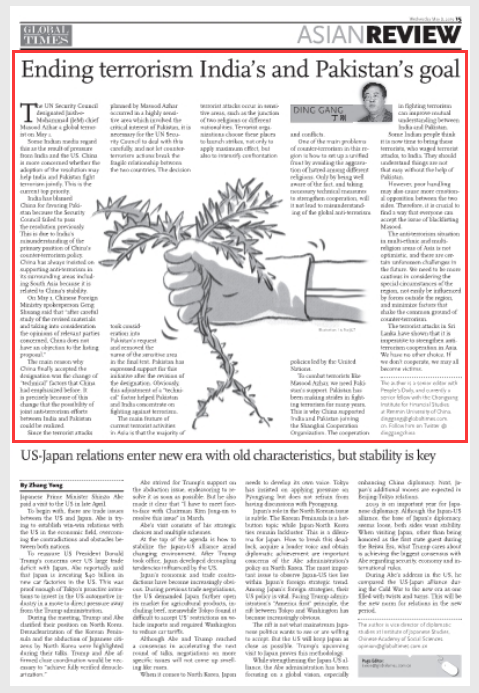Major Power Relations
Your Present Location: PROGRAMS> Major Power RelationsDing Gang: Ending terrorism India’s and Pakistan’s goal
By Ding Gang Source: Global Times Published: 2019-5-7
The UN Security Council designated Jaish-e-Mohammad (JeM) chief Masood Azhar a global terrorist on May 1.
Some Indian media regard this as the result of pressure from India and the US. China is more concerned whether the adoption of the resolution may help India and Pakistan fight terrorism jointly. This is the current top priority.

India has blamed China for favoring Pakistan because the Security Council failed to pass the resolution previously. This is due to India's misunderstanding of the primary position of China's counter-terrorism policy. China has always insisted on supporting anti-terrorism in its surrounding areas including South Asia because it is related to China's stability.
On May 1, Chinese Foreign Ministry spokesperson Geng Shuang said that "after careful study of the revised materials and taking into consideration the opinions of relevant parties concerned, China does not have an objection to the listing proposal."
The main reason why China finally accepted the designation was the change of "technical" factors that China had emphasized before. It is precisely because of this change that the possibility of joint anti-terrorism efforts between India and Pakistan could be realized.
Since the terrorist attacks planned by Masood Azhar occurred in a highly sensitive area which involved the critical interest of Pakistan, it is necessary for the UN Security Council to deal with this carefully, and not let counter-terrorism actions break the fragile relationship between the two countries. The decision took consideration into Pakistan's request and removed the name of the sensitive area in the final text. Pakistan has expressed support for this initiative after the revision of the designation. Obviously, this adjustment of a "technical" factor helped Pakistan and India concentrate on fighting against terrorism.
The main feature of current terrorist activities in Asia is that the majority of terrorist attacks occur in sensitive areas, such as the junction of two religions or different nationalities. Terrorist organizations choose these places to launch strikes, not only to apply maximum effect, but also to intensify confrontation and conflicts.
One of the main problems of counter-terrorism in this region is how to set up a unified front by avoiding the aggravation of hatred among different religions. Only by being well aware of the fact, and taking necessary technical measures to strengthen cooperation, will it not lead to misunderstanding of the global anti-terrorism policies led by the United Nations.
To combat terrorists like Masood Azhar, we need Pakistan's support. Pakistan has been making strides in fighting terrorism for many years. This is why China supported India and Pakistan joining the Shanghai Cooperation Organization. The cooperation in fighting terrorism can improve mutual understanding between India and Pakistan.
Some Indian people think it is now time to bring these terrorists, who waged terrorist attacks, to India. They should understand things are not that easy without the help of Pakistan.
However, poor handling may also cause more emotional opposition between the two sides. Therefore, it is crucial to find a way that everyone can accept the issue of blacklisting Masood.
The anti-terrorism situation in multi-ethnic and multi-religion areas of Asia is not optimistic, and there are certain unforeseen challenges in the future. We need to be more cautious in considering the special circumstances of the region, not easily be influenced by forces outside the region, and minimize factors that shake the common ground of counter-terrorism.
The terrorist attacks in Sri Lanka have shown that it is imperative to strengthen anti-terrorism cooperation in Asia. We have no other choice. If we don't cooperate, we may all become victims.
The author is a senior editor with People's Daily, and currently a senior fellow with the Chongyang Institute for Financial Studies at Renmin University of China.























































































 京公网安备 11010802037854号
京公网安备 11010802037854号





